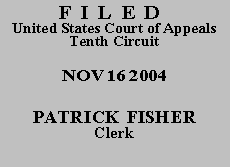

| HAYDAR HAMEED AL-REKABI,
Petitioner, v. JOHN ASHCROFT, Respondent. |
|
BACKGROUND
Petitioner, a native and citizen of Iraq, was admitted to the United States as a refugee on March 29, 1995. On June 21, 2001, Petitioner pleaded guilty in Utah state court to the attempted purchase or possession of a dangerous weapon, a class A misdemeanor. On May 21, 2002, the Immigration and Naturalization Service (INS)(1) issued Petitioner a notice to appear, charging him with being removable under § 237(a)(2)(C) of the Immigration and Nationality Act, codified at 8 U.S.C. § 1227(a)(2)(C), as a result of this conviction.
At a hearing before an immigration judge (IJ) on November 4, 2002, Petitioner, through counsel, admitted the factual allegations against him and conceded the charge of removability, but sought asylum, withholding of removal, and relief under the Convention Against Torture (CAT). On December 2, 2002, the IJ issued an oral decision finding that "removability has been established by clear, unequivocal and convincing evidence." Admin. R. at 45. But the IJ granted Petitioner's request for asylum, stating, "I think [Petitioner is] a little gang banger that . . . doesn't want to admit anything. But . . . it's obvious from looking at the State Department Report . . . . [that if] this guy goes back to Iraq, he's in trouble." Id. at 48.
The INS appealed the IJ's decision to the BIA. On April 22, 2003, the BIA vacated the IJ's December 2, 2002, decision, and ordered Petitioner removed from the United States. Petitioner had, in the BIA's words, "failed to demonstrate either past persecution or a well-founded fear of persecution 'on account of' a ground enumerated in the Act." Id. at 3. According to the BIA, the IJ had erred by granting Petitioner asylum "based solely upon speculation as to what [his] situation may be if returned to Iraq." Id. This petition for review followed.
ANALYSIS
"Although we ultimately hold that we do not have jurisdiction to review Petitioner's petition, we do have jurisdiction to determine the applicability of the jurisdictional bar of [8 U.S.C.] § 1252(a)(2)(C)." Khalayleh v. INS, 287 F.3d 978, 979 (10th Cir. 2002). See Tapia Garcia v. INS, 237 F.3d 1216, 1220 (10th Cir. 2001) (this court retains jurisdiction "to determine whether the jurisdictional bar applies" by deciding "whether the petitioner is (i) an alien (ii) deportable (iii) by reason of a criminal offense listed in the statute"). Petitioner's alienage is not in dispute. And, as previously mentioned, Petitioner admitted the factual allegations contained in the notice to appear and conceded the charge of removability. He likewise conceded during his merits hearing that he had pleaded guilty to possession of a dangerous weapon, for which he served 187 days in jail. Section 1252(a)(2)(C) of Title 8 to the United States Code bars judicial review of final orders of removal entered "against an alien who is removable by reason of having committed a criminal offense covered in section . . . 1227(a)(2) . . . (C) . . . of this title." Section 1227(a)(2)(C) of Title 8 provides:
Any alien who at any time after admission is convicted under any law of purchasing, selling, offering for sale, exchanging, using, owning, possessing, or carrying, or of attempting or conspiring to purchase, sell, offer for sale, exchange, use, own, possess, or carry, any weapon, part, or accessory which is a firearm or destructive device (as defined in section 921(a) of Title 18) in violation of any law is deportable.
(Emphasis added). Petitioner is removable by reason of having committed a criminal offense covered by 8 U.S.C. § 1227(a)(2)(C). And 8 U.S.C. § 1252(a)(2)(C) precludes us from reviewing the BIA's April 22, 2003, final order of removal.
Petitioner contends that the issue before us is whether he should be granted asylum or relief under the CAT, not whether he was convicted of an offense rendering him removable. This contention misses the essential point. He is asking for review of an order of removal. And given his conviction, such review is barred by statute. Although he suggests that there may be constitutional limits on such a jurisdictional bar, he presents no argument why there is such a limit here.
Because we lack jurisdiction to review Petitioner's petition, Respondent's motion to dismiss is GRANTED and Petitioner's petition for review is DISMISSED.
Entered for the Court
Circuit Judge
*. After examining the briefs and appellate record, this panel has determined unanimously that oral argument would not materially assist the determination of this appeal. See Fed. R. App. P. 34(a)(2); 10th Cir. R. 34.1(G). The case is therefore ordered submitted without oral argument. This order and judgment is not binding precedent, except under the doctrines of law of the case, res judicata, and collateral estoppel. The court generally disfavors the citation of orders and judgments; nevertheless, an order and judgment may be cited under the terms and conditions of 10th Cir. R. 36.3.
2. The Honorable Clarence A. Brimmer, District Judge, United States District Court for the District of Wyoming, sitting by designation.
1. "The INS ceased to exist on March 1, 2003, and its functions were transferred to the U.S. Citizenship and Immigration Services ("USCIS") within the newly formed Department of Homeland Security." Sviridov v. Ashcroft, 358 F.3d 722, 724 n.1 (10th Cir. 2004).